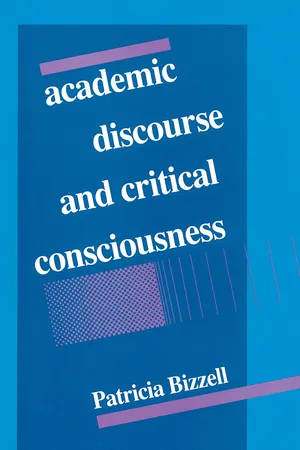
- English
- PDF
- Available on iOS & Android
Academic Discourse and Critical Consciousness
About This Book
This collection of essays traces the attempts of one writing teacher to understand theoretically - and to respond pedagogically - to what happens when students from diverse backgrounds learn to use language in college.Bizzell begins from the assumption that democratic education requires us to attempt to educate all students, including those whose social or ethnic backgrounds may have offered them little experience with academic discourse. Over the ten-year period chronicled in these essays, she has seen herself primarily as an advocate for such students, sometimes called "basic writers."Bizzell's views on education for "critical consciousness, " widely discussed in the writing field, are represented in most of the essays in this volume. But in the last few chapters, and in the intellectual autobiography written as the introduction to the volume, she calls her previous work into question on the grounds that her self-appointment as an advocate for basic writers may have been presumptous, and her hopes for the politically liberating effects of academic discourse misplaced. She concludes by calling for a theory of discourse that acknowledges the need to argue for values and pedagogy that can assist these arguements to proceed more inclusively than ever before.The essays in this volume constitute the main body of work in which Bizzell developed her influential and often cited ideas. Organized chronologically, they present a picture of how she has grappled with major issues in composition studies over the past decade. In the process, she sketches a trajectory for the development of composition studies as an academic discipline.
Frequently asked questions
Information
Table of contents
- Contents
- Introduction
- The Ethos of Academic Discourse
- Thomas Kuhn, Scientism, and English Studies
- "Inherent" Ideology, "Universal" History, "Empirical" Evidence, and "Context-Free" Writing: Some Problems in E. D. Hirsch's The Philosophy of Composition (Coauthored with Bruce Herzberg)
- Cognition, Convention, and Certainty: What We Need to Know About Writing
- College Composition: Initiation Into the Academic Discourse Community
- Academic Discourse and Critical Consciousness: An Application of Paulo Freire
- William Perry and Liberal Education
- What Happens When Basic Writers Come to College?
- Composing Processes: An Overview
- Foundationalism and Anti-Foundationalism in Composition Studies
- What Is a Discourse Community?
- Arguing About Literacy
- Beyond Anti-Foundationalism to Rhetorical Authority: Problems Defining "Cultural Literacy"
- Afterword